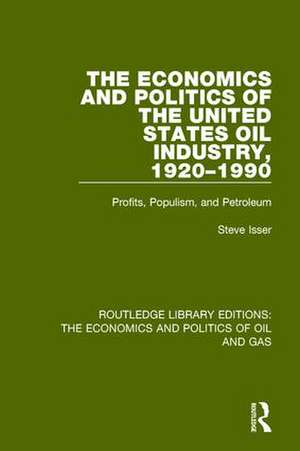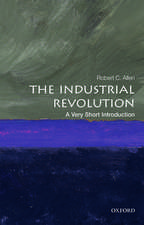The Economics and Politics of the United States Oil Industry, 1920-1990: Profits, Populism and Petroleum: Routledge Library Editions: The Economics and Politics of Oil and Gas
Autor Steve Isseren Limba Engleză Paperback – 27 feb 2018
| Toate formatele și edițiile | Preț | Express |
|---|---|---|
| Paperback (1) | 246.21 lei 6-8 săpt. | |
| Taylor & Francis – 27 feb 2018 | 246.21 lei 6-8 săpt. | |
| Hardback (1) | 742.91 lei 6-8 săpt. | |
| Taylor & Francis – 29 mar 2016 | 742.91 lei 6-8 săpt. |
Preț: 246.21 lei
Preț vechi: 299.00 lei
-18% Nou
Puncte Express: 369
Preț estimativ în valută:
47.12€ • 51.16$ • 39.58£
47.12€ • 51.16$ • 39.58£
Carte tipărită la comandă
Livrare economică 22 aprilie-06 mai
Preluare comenzi: 021 569.72.76
Specificații
ISBN-13: 9781138654884
ISBN-10: 1138654884
Pagini: 490
Dimensiuni: 156 x 234 x 33 mm
Greutate: 0.7 kg
Ediția:1
Editura: Taylor & Francis
Colecția Routledge
Seria Routledge Library Editions: The Economics and Politics of Oil and Gas
Locul publicării:Oxford, United Kingdom
ISBN-10: 1138654884
Pagini: 490
Dimensiuni: 156 x 234 x 33 mm
Greutate: 0.7 kg
Ediția:1
Editura: Taylor & Francis
Colecția Routledge
Seria Routledge Library Editions: The Economics and Politics of Oil and Gas
Locul publicării:Oxford, United Kingdom
Public țintă
General, Postgraduate, and UndergraduateCuprins
1. Development of the System of Control 2. The Battle Over the Oil Import Quota 3. The Oil Crises 4. Economists, Energy and Public Policy 5. Public Opinion and Oil Politics 6. Congressional Voting on Oil Issues 7. Interest Groups, Rent Seeking and Oil Politics
Descriere
This book, originally published in 1996, traces the development of US government policy toward the oil industry during the 1920s and 1930s when the domestic syustem of production control was established. It then charts the deveopment and collapse of oil import controls, and the wild scramble for economic rents generated by Government regulation. It discusses the two oil crises and the ‘phantom’ Gulf War crisis, and the importance of public opinion in shaping the policy agenda. It also provides an in-depth study of Congressional oil votes from the 1950s to the 1980s and the formation of oil policy, beginning with theories of economic regulation, the role of interest groups in developing the policy agenda and the role of money in politics.




















